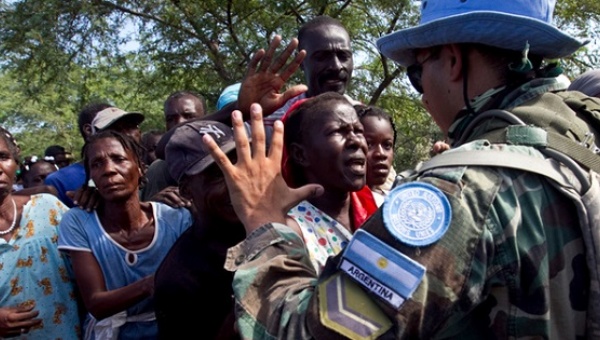-
Tips for becoming a good boxer - November 6, 2020
-
7 expert tips for making your hens night a memorable one - November 6, 2020
-
5 reasons to host your Christmas party on a cruise boat - November 6, 2020
-
What to do when you’re charged with a crime - November 6, 2020
-
Should you get one or multiple dogs? Here’s all you need to know - November 3, 2020
-
A Guide: How to Build Your Very Own Magic Mirror - February 14, 2019
-
Our Top Inspirational Baseball Stars - November 24, 2018
-
Five Tech Tools That Will Help You Turn Your Blog into a Business - November 24, 2018
-
How to Indulge on Vacation without Expanding Your Waist - November 9, 2018
-
5 Strategies for Businesses to Appeal to Today’s Increasingly Mobile-Crazed Customers - November 9, 2018
United Nations admits role in Haiti cholera outbreak
A 2011 study by the U.S. Centers for Disease Control and Prevention said United Nations peacekeepers from Nepal, where cholera is endemic, were the likely cause of the outbreak of the water-borne disease.
Advertisement
The UN has finally acknowledged it played a role in an outbreak of cholera in Haiti in 2010 that has since killed about 10,000 people in the country.
Already one of the world’s poorest countries, Haiti was reeling from a devastating quake on January 12, 2010, that killed more than 200,000 people when its misery was compounded by the cholera outbreak.
In the 19-page report, obtained from an official who had access to it, Alston took issue with the U.N.’s public handling of the outbreak, which was first documented in mid-October 2010, shortly after people living along the Meille River began dying from the disease.
Farhan Haq, a spokesperson for the office of UN Secretary-General Ban Ki-moon, admitted for the first time thatUN peacekeepers were involved in the initial spread of the disease in the country.
Haq reiterated Thursday that the U.N.’s legal position in claiming diplomatic immunity “has not changed”. The United Nations has never accepted responsibility, and has answered lawsuits on behalf of victims in US courts by claiming diplomatic immunity.
The Institute for Justice & Democracy in Haiti (IJDH) has been pursuing a class-action lawsuit against the United Nations in an effort to get the world body to accept responsibility for its actions and to pay compensation to the victims.
Haq said worldwide and national efforts have led to a 90 percent reduction in the number of cases since the peak in 2011.
In a decision issued late Thursday, the USA 2nd Circuit Court of Appeals in NY affirmed a lower court’s January 2015 dismissal of a lawsuit brought in the worst outbreak of cholera in recent history.
“We will continue to fight to get financial compensation for cholera victims, a formal public apology that victims are demanding and ensure the United Nations does much more to support water and sanitation efforts to eradicate cholera in Haiti” IJDH lawyer Lindstrom said.
It was a significant statement because the United Nations has for years kept silent about allegations its peacekeepers introduced cholera to Haiti.
Linstrom added that the real test of the UN’s intentions was what comes next.
Cholera, which is transmitted through contaminated drinking water and causes acute diarrhoea, is a major challenge in a country with poor sanitary conditions.
The French epidemiologist goes on to say that “neither local politicians nor the worldwide community seems to have taken the measure of the seriousness of the situation”.
Alston wrote that the U.N.’s Haiti cholera policy “is morally unconscionable, legally indefensible and politically self-defeating”.
Alston, who declined to comment for this article, will present the final report at the opening of the General Assembly in September, when presidents, prime ministers and monarchs from almost every country gather at United Nations headquarters in NY. Cholera is endemic in Nepal.
In his statement, the UN’s deputy spokesman said: “The UN has been heavily engaged in cholera eradication since the 2010 outbreak”.
“The secretary-general deeply regrets the awful suffering the people of Haiti have endured as a result of the cholera epidemic”, Haq said.
The epidemic is now estimated to have affected 780,000 people, according to figures released by the U.N. At least one study has suggested that the death toll could be much higher than the official figures.
Advertisement
Details were scant, however, and Haq declined to clarify if the United Nations was considering paying repartitions to the families of those killed, citing that the batch of proposals is “not something we’re describing as reparations”.





























